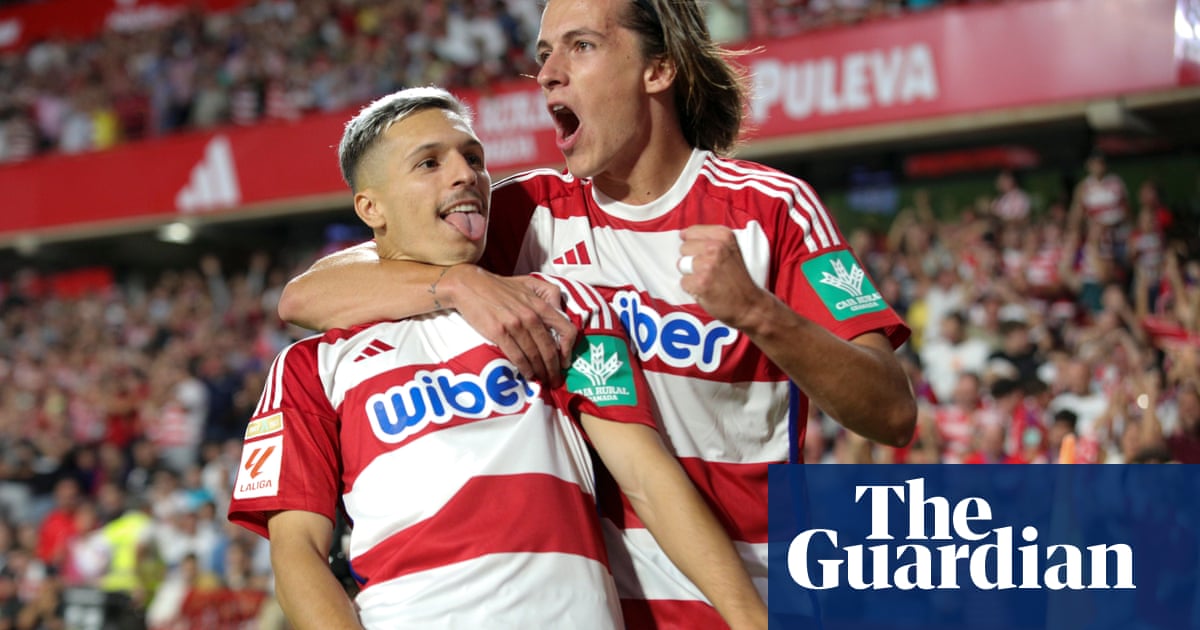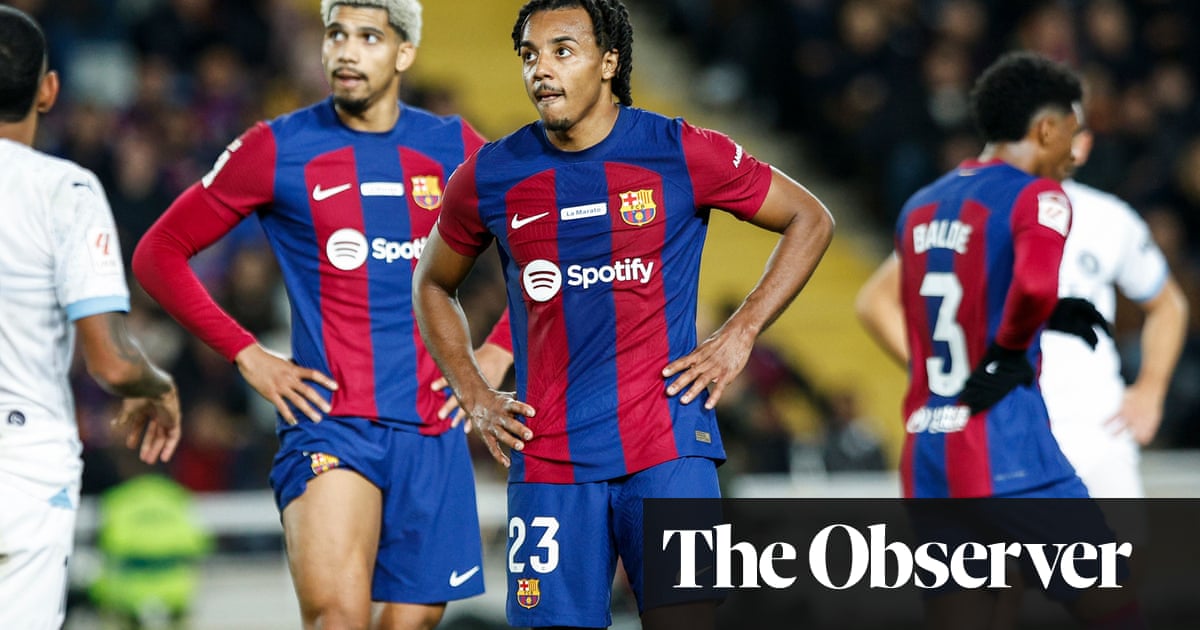
Bryan Zaragoza’s mum hadn’t slept, her stomach hurt and she couldn’t stop fiddling with her phone. She was tense and nervous and she couldn’t relax, the messages mounting up as the moment got closer: the day her little boy, the winger who grew up watching Lionel Messi and was in the third tier a year ago, faced Barcelona for the first time. He, on the other hand, was not: “I never get nervous,” the Granada forward said, and it showed. Which is why he admitted he had been calming her down and why after midnight on Sunday, when it was all over, they still hadn’t spoken but he had seen her, up there among the delirious crowd, with a look of happiness on her face.
It had been his grand night – not his first and maybe not even his best but certainly his biggest and most emotional – and long after everyone else had left, Zaragoza was still there, standing beneath the silent stands trying to take it all in. Trying to take out what he called a “thorn” from his side too; that still hurt, he said, despite everything. The clock had shown 87.34 when he cracked a shot against Marc-André ter Stegen’s post. On the night when the team who are second-bottom had gone into a 2-0 lead only for Barcelona to come back to draw 2-2, Sergi Roberto equalising two minutes before, Zaragoza’s shot would have put Granada 3-2 up. It would also have been ridiculous.
It was silly enough as it was. The man playing just his ninth primera game could have been heading home with the match ball, João Félix’s shirt and his team securing a win they desperately needed, sure. But if he could barely believe it when the ball bounced back, his head in his hands, if he declared he wanted “more”, everyone else could barely believe what they had seen already. They would hardly have enjoyed it more, either. And, although he didn’t know it yet, it was about to get even better; by the time he did finally head home, he heard that he had been called up to the Spain squad. That’s how good he had been: not just a 22-year-old first division debutant scoring twice but everything he did, and the way he did it.
His way.
Before the game, Granada defender Raúl Torrente described Zaragoza as a “star who will be big, who can go as far as he wants” and insisted he would choose him over Lamine Yamal. At the time it sounded like the kind of thing that he would say, not least because it was, but when the match ended, it no longer seemed quite so far-fetched. On Sunday night, Yamal became the youngest goalscorer in La Liga history, aged just 16 years and 87 days, nudging in a simple finish to start a Barcelona comeback denied by Félix’s late winner being ruled out for offside. But it was Zaragoza who had dominated and went one better. “Barcelona don’t find the Life of Bryan funny,” ran the headline in Marca, but everyone else had.
If the first goal was fast, arriving just 17 seconds in – the earliest goal Granada had ever scored and Barcelona had ever conceded – the second was something else, a work of art. “Maradonian,” said the Granada newspaper, Ideal.
Jules Koundé had not been dribbled round once this season; Zaragoza did it twice in the same move. Sent dashing up the left, he held off Koundé, cut inside, cut back again, almost seemingly to hover over the ball. Changing direction mid air, he sent the Frenchman out for the papers, torso taken off at the hips, legs tied in a cartoon knot. As Koundé tried to turn back and recover his position, he literally stumbled, feet in the wrong place. Before he could work out where they were, with Ter Stegen falling too, a second man sold the dummy, Zaragoza put the ball into net with the outside of his boot. “Well, If I had tried with my left, I would have fallen over and Ter Stegen would have been able to pick the ball up like a baby,” he told Dazn afterwards, which seriously undersold a brilliant goal. “Bestial” teammate Gonzalo Villar called it. “I was freaking out.”
And, Villar said as he ran after Zaragoza, the best thing of all was that he had him in his Fantasy team.
Well of course he does. After all, this was no one off. Not here, not anywhere. The goal of the season so far might not even be the best he has scored – check out the strike against Mirandés last year, or better still Lugo – and he is now on five in his first ever season in the top flight. In Granada, they knew. The difference now was the emotion, the stage; and this was the biggest of them all. He hadn’t had time to read all the messages, still less reply, but he had noticed 5,000 new followers on Instagram, he admitted afterwards, his arrival announced to the world. And for a player whose buy-out clause is only €14m. No wonder Villar joked: “Nah, he’s rubbish. Today was just luck.”
He’ll be gone soon enough, the height of their aspiration now just to hold on until the end of the season but, Ideal insisted, every minute he plays for Granada is a gift.
A footballer whose idol was Messi, admired Neymar and follows Vinícius Júnior, Zaragoza didn’t come through a youth system, which might just be a good thing, no academic automaton. Playing instead at his local teams CD Tiro Pichón and Conejito La Luz and having been turned down not just by Sevilla, Betis and Valladolid but by his struggling home town team Málaga too, he finally joined Granada three years ago. There is a reason he loves them, pulling at the badge as he celebrated last night, and there are plenty of reasons they love him back. Last season, having never even played second division football before, he was a revelation, scoring in each of their last three games to clinch the title.
Not that it’s about the goals; it’s about the electricity, the excitement. There is something about Zaragoza, something different. “The kind of player that doesn’t really exist any more,” as Aimara Gil put it in AS. At 5ft 5in he is the smallest small player in the league. “A bullet,” Xavi called him. “A diamond,” in Villar’s words, he’s entirely fearless and very, very fun. Which, while it’s all too easily forgotten, is supposed to be the whole point of this thing. Get it wrong? Go again. And again, and again. No one in Spain has attempted as many dribbles. In fact, no one in any of Europe’s top five leagues has – and he is miles ahead of Leroy Sané in second. There was a moment in Sunday’s game when Ronald Araújo approached him and said: “Do you want to stop running, you bastard?”
But this is what he does. Whoever is in front of him, he will take on, even the best defenders from all over in the world – and soon it will be. Late in the game the fans had started chanting for Zaragoza to get a call-up to the national team. Asked about the prospect he said: “I’d walk there.” And by the time he was finally on his way home, it was all he could do to pop in and pick up his hiking boots: after all, it was late and a long way from Federation HQ in Las Rozas. At 00.34, the man who had only played nine first division games and hadn’t even been on the 49-man shortlist was added into the Spain squad. Replacing the injured Yéremy Pino, he became the first Granada player called up for his country since 1974 and only the fourth ever.
“I am what I am,” he says. “If you go on to the pitch nervous instead of to enjoy it, you’re not going to play. Sure, you get that feeling in your stomach: bloody hell, it’s Barcelona, but I never play with nerves because that’s the way I am. Maybe the fear means that some players get the ball and get rid of it again. I don’t. I come here to enjoy it. A year ago I was in Second Division B. You have to respect the rival but I don’t care who is in front of me, I’m going to do the same thing I always do: against Barcelona, Rayo, Mallorca, Madrid, whoever comes. I’ll play my football because that’s me.
“In the end, I’m a street player. When I was little, I played futbol sala and on the street. I do the same now as when I was small. I always liked football, and I play to enjoy it.”












